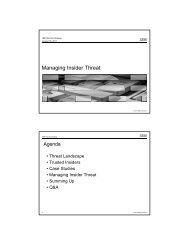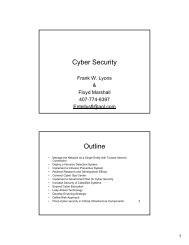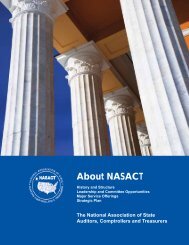Advisory Committee on Tax Exempt and Government Entities (ACT ...
Advisory Committee on Tax Exempt and Government Entities (ACT ...
Advisory Committee on Tax Exempt and Government Entities (ACT ...
Create successful ePaper yourself
Turn your PDF publications into a flip-book with our unique Google optimized e-Paper software.
The Appropriate Role Of The Internal Revenue Service With Respect To <strong>Tax</strong>-<strong>Exempt</strong> Organizati<strong>on</strong> Good Governance Issuesthe st<strong>and</strong>ards for exempti<strong>on</strong> have been met. In additi<strong>on</strong> to these documentedattempts by the IRS to m<strong>and</strong>ate specific governance practices, there issignificant anecdotal evidence that the IRS is requiring new organizati<strong>on</strong>s toadopt a c<strong>on</strong>flict of interest policy as a c<strong>on</strong>diti<strong>on</strong> for exempti<strong>on</strong>. There even arereported instances where the IRS required its form of c<strong>on</strong>flict of interest policy tobe adopted. Again, while the existence of a c<strong>on</strong>flict of interest policy mayappropriately be viewed as a favorable factor <strong>on</strong> determinati<strong>on</strong>, we do not believeit should be a per se requirement.The <strong>on</strong>e situati<strong>on</strong> where we believe it is appropriate for the IRS to have latitude inseeking to impose specific governance practices is where the IRS has identifiedan organizati<strong>on</strong> that has committed <strong>on</strong>e or more grievous violati<strong>on</strong>s of thest<strong>and</strong>ards for tax exempti<strong>on</strong>. One example is an organizati<strong>on</strong> that violates theinurement proscripti<strong>on</strong> <strong>and</strong> where the IRS has the right to revoke exempti<strong>on</strong> inadditi<strong>on</strong> to imposing secti<strong>on</strong> 4958 excise taxes. 144 In such a case, <strong>and</strong> subject toour recommendati<strong>on</strong>s with respect to c<strong>on</strong>sistency <strong>and</strong> fairness below, we believethe IRS should have discreti<strong>on</strong> in determining whether to propose revocati<strong>on</strong> ofexempti<strong>on</strong> of a culpable organizati<strong>on</strong> or to allow the organizati<strong>on</strong> to undergosufficient changes that its charitable missi<strong>on</strong> can be preserved in a c<strong>on</strong>text thatmakes future violati<strong>on</strong>s highly unlikely. In fact, we hope that where there issufficient charitable missi<strong>on</strong> to preserve that the IRS will seek to createc<strong>on</strong>diti<strong>on</strong>s that allow the organizati<strong>on</strong> to c<strong>on</strong>tinue. In this regard, we think it isappropriate for the IRS, in its judgment, to seek to c<strong>on</strong>diti<strong>on</strong> c<strong>on</strong>tinued exempti<strong>on</strong><strong>on</strong> the adopti<strong>on</strong> of extensive governance changes that are reas<strong>on</strong>ably implicatedin the charity’s wr<strong>on</strong>gdoings. These could include, for example: requiring achange in directors, officers <strong>and</strong>/or senior managers; imposing independencerequirements for the board as a whole <strong>and</strong>/or in c<strong>on</strong>necti<strong>on</strong> with variousdecisi<strong>on</strong>s of the organizati<strong>on</strong> such as executive compensati<strong>on</strong>, joint ventures,<strong>and</strong> financial oversight; m<strong>and</strong>ating approval processes that assure involvementof directors or key employees; requiring adopti<strong>on</strong> of various policies such as ac<strong>on</strong>flicts of interest policy <strong>and</strong>/or whistleblower policy; requiring the governingboard <strong>and</strong> senior managers to undertake training <strong>on</strong> their respective roles <strong>and</strong>resp<strong>on</strong>sibilities; <strong>and</strong> requiring greater transparency. In making its determinati<strong>on</strong>,we believe the IRS should take into account self-initiated changes theorganizati<strong>on</strong> has voluntarily undertaken, particularly when undertaken beforegovernment c<strong>on</strong>tact. Of course, if the organizati<strong>on</strong> does not voluntarily agree tomake the changes, the IRS cannot force it to do so; it can instead revoke theorganizati<strong>on</strong>’s exempti<strong>on</strong>, <strong>and</strong> the organizati<strong>on</strong>, in turn, has the right to challengethat determinati<strong>on</strong> in court.A more challenging situati<strong>on</strong> for us is where the compliance initiative showsevidence of operati<strong>on</strong>al c<strong>on</strong>cerns but not at a level that would result inrevocati<strong>on</strong>. This might include, for example, an instance where there was apurchase of property from a pers<strong>on</strong> involved with the organizati<strong>on</strong> who was not adisqualified pers<strong>on</strong> at a price just in excess of fair market value, without a formal14470 Fed. Reg. 53599 (March 27, 2008).ADVISORY COMMITTEE ON TAX EXEMPT AND GOVERNMENT ENTITIES (<strong>ACT</strong>) June 11, 2008 49













